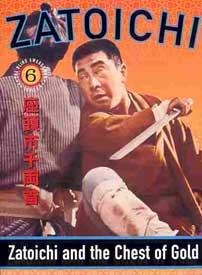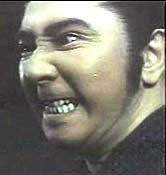 Imagine a blind masseur like a ghost standing in the pitch of night, blowing his eerie whistle to announce to an invisible neighborhood that a masseur is passing through, available for massage. Imagine a blind masseur like a ghost standing in the pitch of night, blowing his eerie whistle to announce to an invisible neighborhood that a masseur is passing through, available for massage.
Three gangsters rush into the scene, & like the blind masseur, they seem to be suspended in space, the darkness rendering their environment invisible.
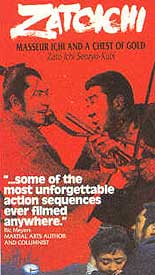 The three men attack the blind man, who draws a sword from out of his cane, & in a couple rapid sweeps, three men drop on all sides. Zatoichi resheathes his canesword, & picks up again the only sound in the night (there is no music track for this scene), continuing on his way blowing the plaintive masseur's whistle. The three men attack the blind man, who draws a sword from out of his cane, & in a couple rapid sweeps, three men drop on all sides. Zatoichi resheathes his canesword, & picks up again the only sound in the night (there is no music track for this scene), continuing on his way blowing the plaintive masseur's whistle.
As the opening credits appear in the blackness of the screen, we get a couple similar tableaus drifting in darkness, Ichi kiling many assaultive yakuza & wanderers. The experimental artistry of these opening credits battles are something new for the blind swordsman series, which rarely used outre visuals.
The story proper begins for Zatoichi & the Chest of Gold (Zatoichi sen-ryu kubi, 1964), with our famous blind swordsman & humble masseur returns to a village where he wrongly killed a man, to pay apologetic respects at his graveside, while the man's sister seeks revenge against him.
When gold collected by villagers to pay their taxes is stolen, the angry young woman insinuates that Ichi may have something to do with it, though Ichi being a blind wanderer had no idea he had been seen sitting on the very chest in question.
The villagers set upon Ichi beating him. He does not want to harm them & he agrees the sister's desire for vengeance is justified, so he dare not fight back in his ultimate manner. Therefore his canesword remains sheathed.
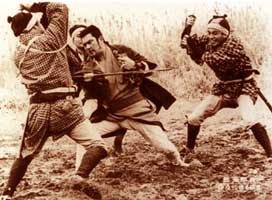 Soon Ichi is caught up trying to clear his name of the theft, as well as helping to clear the name of the other chief suspect, the famed wandering gang boss Chuji of Kunisada (Shogo Shimada), a character featured in many films from the silent era on, & who was previously met in the fourth Zatoichi feature film, Zatoichi the Fugitive (Zatoichi kyojo-tabi, 1963). Soon Ichi is caught up trying to clear his name of the theft, as well as helping to clear the name of the other chief suspect, the famed wandering gang boss Chuji of Kunisada (Shogo Shimada), a character featured in many films from the silent era on, & who was previously met in the fourth Zatoichi feature film, Zatoichi the Fugitive (Zatoichi kyojo-tabi, 1963).
Katsu's brother Tomisaburo Wakayma (listed in the credits as Kenzaburo Jo, a name he used briefly), best known the west for his "Babycart" movies, guest stars as Jushiro, the yojimbo (bodyguard) of the evil magistrate Monji. Wakayama was in the second episode of the series, too, actually playing Ichi's fictional brother; but the character he plays here is unrelated.
In a stern scene in a gambling hall, Ichi meets the Yojimbo, who reveals his swordskill by cutting a small coin in half, using his shortsword.
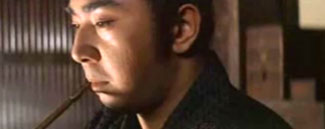 Ichi feels the two halves of the coin, is duly impressed, & accepts an extravagant bet regarding his own iai draw, while sitting across from one another at the dicing mat. Ichi feels the two halves of the coin, is duly impressed, & accepts an extravagant bet regarding his own iai draw, while sitting across from one another at the dicing mat.
He more than duplicates Jushiro's skill, & scoops up his winnings. Inevitably they will meet each other in the final duel, which is a doozy.
The actual thief of the one-thousand ryo chest is Monji, the very man who is hunting down Chuji & Zatoichi, with intent to kill them as guilty of his own crime. Monji fights with bullwhip as well as sword, & despises "lowly worms" like Ichi who think they have mastered the sword.
Monji's high opinion of his buke warrior class is not substantiated by his character, which is so corrupt he is not only a thief & unjust killer, bukt he would even put a small child's life at risk, which forces Ichi to protect the boy.
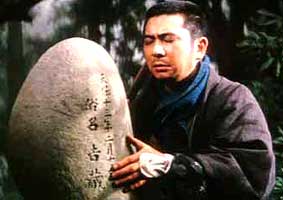 From the very first episode on, there was a mythic quality to Ichi, who could smile so winningly & was so very humble & well meaning, but whose face could suddenly go dark & gloomy with the highest degree of menace. From the very first episode on, there was a mythic quality to Ichi, who could smile so winningly & was so very humble & well meaning, but whose face could suddenly go dark & gloomy with the highest degree of menace.
In Chest of Gold the bloodiness of the swordplay action increased in intensity, & Ichi's capacity to transform from sweet blind guy to whirlwind of reverse-draw death was amped up, as it would remain through much of the long-running series from this point on.
Fight choreography is simply amazing, but the action never expunges the depth of Ichi's character & his relationships to other figures in the tale.
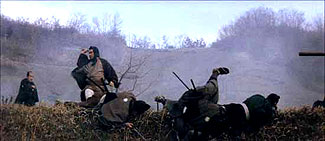 We're given long tracking shots for scenes of violent action, so that the choreography, & Katsushin's talent at chambara swordplay, is not being fudged with quick edits & numerous retakes. We're given long tracking shots for scenes of violent action, so that the choreography, & Katsushin's talent at chambara swordplay, is not being fudged with quick edits & numerous retakes.
Akira Kurosawa's cinematographer Kazuo Miyagawa provides a classic elegance to the film. He would return for many other episodes, sustaining a high level of visual beauty for the series.
There is action throughout, with a spectacularly brutal finale showcasing Ichi's capacity for relentless carnage. This is one of the finest episodes of a series that knew few duds.
copyright © by Paghat the Ratgirl
|
